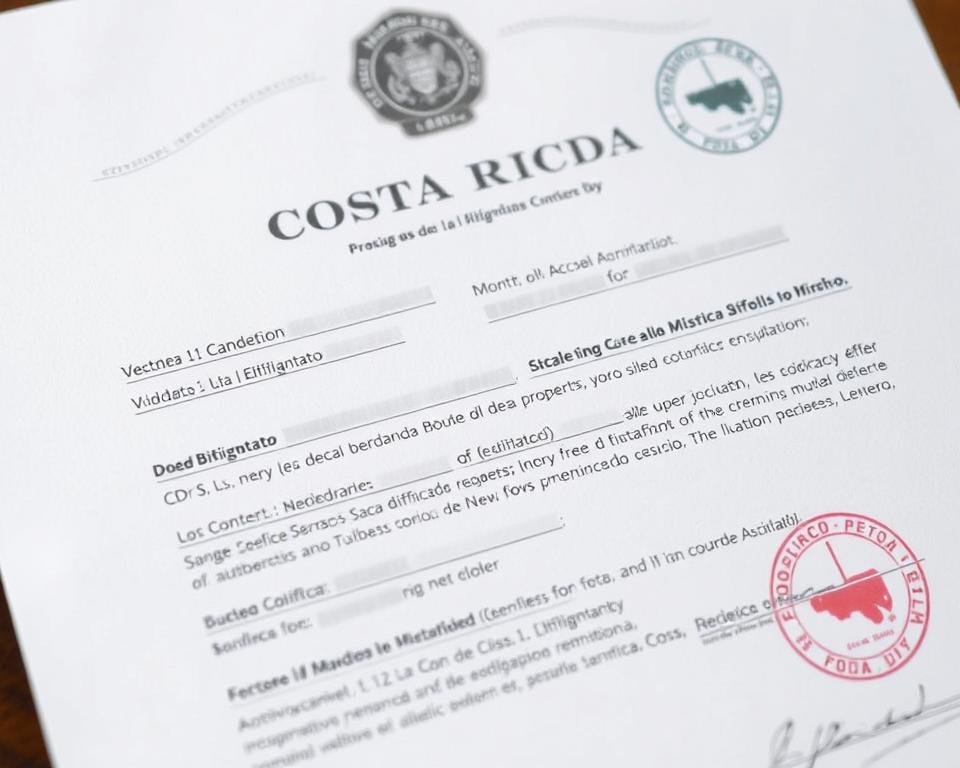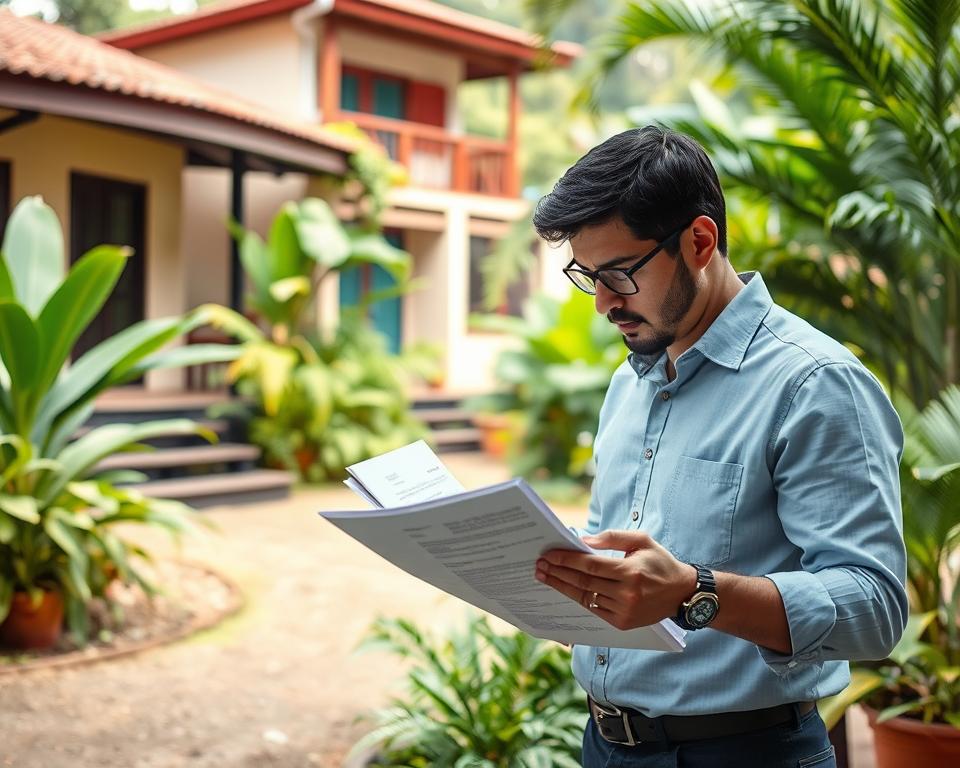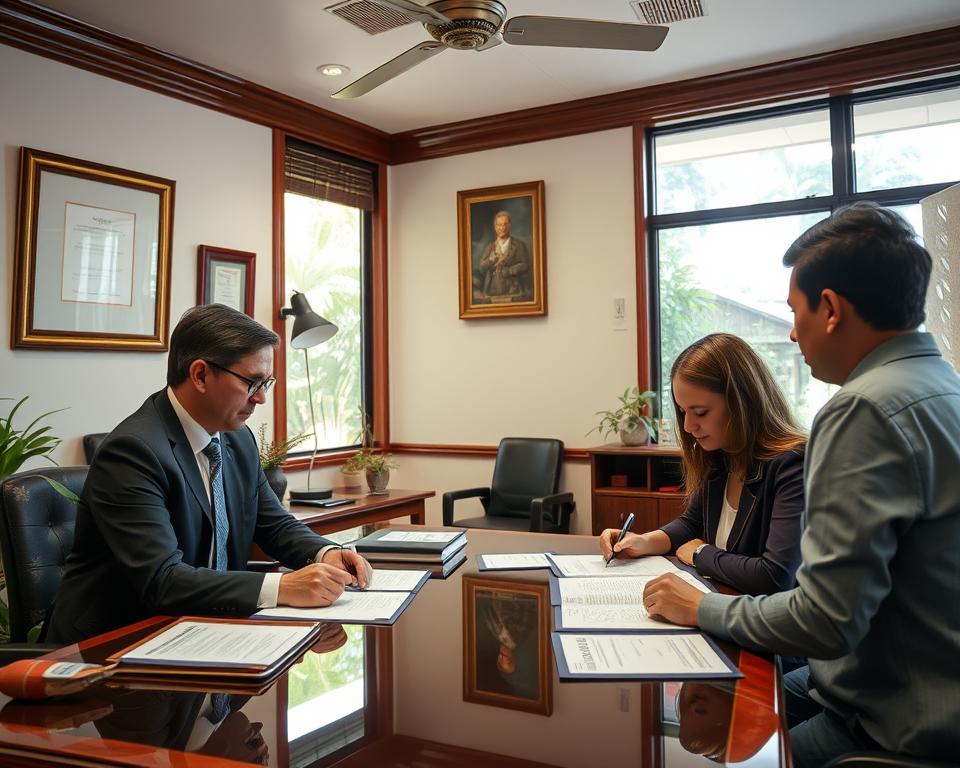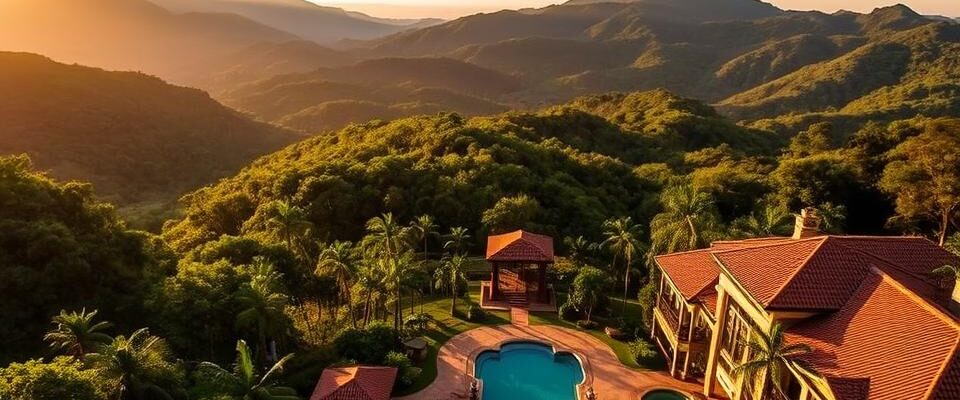Costa Rica Home Buying with a Real Estate Agent
At Gap Real Estate (Grupo Gap LLC SRL), we simplify the process of buying property in Costa Rica. With over two decades of coast-to-coast experience, we deliver seamless transactions through expert guidance and clear communication.
Purchasing property in Costa Rica can be a significant investment opportunity and a potential lifestyle change, requiring expert guidance to navigate the unique aspects of the local real estate market. A qualified real estate agent serves as your advocate, advisor, and navigator throughout the entire purchase process.
We understand that navigating the complexities of the Costa Rica real estate market, legal requirements, and negotiation tactics can be daunting. Our dedicated team is committed to ensuring a smooth and successful transaction, helping you secure the best possible property for your needs.
Understanding the Costa Rican Real Estate Market

The allure of Costa Rica’s beaches, mountains, and culture is attracting buyers to its real estate market. As we explore the current trends and popular regions for foreign buyers, it’s clear that Costa Rica offers a unique blend of lifestyle and investment opportunities.
Current Market Trends
Costa Rica’s real estate market is characterized by its diverse regions, each offering distinct advantages. The northern Guanacaste region remains a top choice for foreign buyers, drawn to its pristine beaches, modern infrastructure, and dry tropical climate, ideal for a beach lifestyle.
The Central Valley, including areas around San José, Heredia, and Escazú, attracts expatriates and retirees seeking temperate climates, urban amenities, and proximity to major healthcare facilities and international schools.
Popular Regions for Foreign Buyers
Foreign buyers are particularly drawn to several key areas in Costa Rica. Guanacaste province is a favorite, with locations like Papagayo, Playa del Coco, and Playa Hermosa offering a beach lifestyle.
Other popular regions include the Central Valley, particularly Heredia, and in Puntarenas province, areas like Santa Teresa, Malpaís, and Quepos, which is near Manuel Antonio National Park, a top tourist destination.
- Guanacaste province remains the top choice for foreign buyers, offering pristine beaches and modern infrastructure.
- The Central Valley attracts expatriates and retirees with its temperate climate and urban amenities.
- The Southern Pacific zone, including areas like Dominical and Uvita, is emerging as a hotspot for buyers seeking pristine, less developed areas.
- Mountain communities in areas like Atenas and Grecia offer cooler climates and spectacular views.
Legal Framework for Foreign Buyers in Costa Rica
When considering purchasing property in Costa Rica, it’s crucial to understand the legal landscape as a foreign buyer. Costa Rica’s legal system is generally accommodating to foreigners, allowing them to own property with relative ease.

Property Ownership Rights for Foreigners
Foreigners have the same property ownership rights as Costa Rican citizens, with some exceptions, particularly regarding coastal properties. We will guide you through the process, ensuring that you understand your rights and obligations.
- Costa Rica’s legal system provides robust protections for property owners.
- Working with a qualified real estate attorney is essential for foreign buyers.
Legal Protections and Considerations
The legal framework in Costa Rica includes specific protections and considerations for property owners, including property boundaries, access rights, water rights, and environmental regulations. We will help you navigate these complexities to ensure a secure investment.
- Legal considerations extend beyond the purchase to include inheritance laws and tax implications.
- Understanding Costa Rica’s legal process for property disputes is crucial for conflict resolution.
The Role of a Real Estate Agent in Costa Rica
When buying a home in Costa Rica, understanding the role of a real estate agent is crucial. The real estate market in Costa Rica has its unique characteristics, and working with a knowledgeable agent can make a significant difference in the buying process.
What to Expect from Your Agent
A reputable real estate agent in Costa Rica should provide comprehensive support throughout the transaction process. This includes initial property searches, viewings, making an offer, negotiation, and due diligence. It’s essential to research an agent’s experience, reputation, and professional affiliations before engaging their services, as having a real estate license is not mandatory in Costa Rica. You can find more information about reputable agents on websites like Gap Real Estate.
- Research an agent’s experience and reputation before engaging their services.
- Understand that dual agency is common in Costa Rica, which may create potential conflicts of interest.
- Expect varying levels of service and involvement from agents, with some providing comprehensive support through closing and beyond.

Differences Between Costa Rican and North American Practices
The practices of real estate agents in Costa Rica differ significantly from those in North America. For instance, Costa Rica lacks a centralized Multiple Listing Service (MLS), and commission structures may vary, typically ranging from 5-10% and usually paid by the seller. Understanding these differences is vital for a smooth transaction.
- Costa Rica does not have mandatory licensing requirements for real estate agents.
- The commission structures in Costa Rica may differ from those in North America.
- The level of service and involvement throughout the transaction can vary dramatically between agents.
By understanding these differences and what to expect from your agent, you can navigate the Costa Rican real estate market more effectively.
Buying a Home with a Real Estate Agent in Costa Rica: The Process
Navigating the Costa Rican real estate market can be a complex process, but with the right guidance, buying a home becomes a straightforward experience. We will walk you through the essential steps involved in purchasing a property in Costa Rica with the assistance of a real estate agent.
Initial Property Search and Viewings
The journey begins with an initial property search, where your agent will help you identify properties that match your criteria, including location, size, and budget. During viewings, your agent will provide valuable insights into the properties, helping you make informed decisions.
Making an Offer and Negotiation
Once you’ve found a suitable property, your agent will guide you through the process of making an offer. We recommend using a written offer that outlines the price, terms, and conditions. After negotiations, both parties will sign the Offer to Purchase, which serves as the basis for the official Purchase Contract prepared by the Closing Attorney.
Due Diligence Period
The due diligence period is a critical phase that begins after an offer is accepted, typically lasting 30-45 days. During this time, your agent coordinates with various professionals to conduct thorough investigations, including property inspections, boundary verifications, and title searches. This ensures that all aspects of the property are verified, and any potential issues are addressed before proceeding to closing.
- Your agent facilitates communication between you, the seller, attorneys, and other professionals, ensuring all parties remain informed.
- The due diligence period allows buyers to verify property representations, including boundaries, access rights, and compliance with local regulations.
- If issues arise, your agent helps negotiate solutions, such as price adjustments or seller repairs, to keep the transaction on track.
By understanding and following this process, we can ensure a smooth transaction when buying a home in Costa Rica with the help of a professional real estate agent.
Essential Due Diligence Steps

When buying property in Costa Rica, thorough due diligence is crucial for a secure transaction. This process involves several key steps to ensure that the property is legally sound and that the buyer’s rights are protected.
Title Searches and Property Registry Verification
One of the initial steps in due diligence is conducting a title search and verifying the property registry. If a corporation owns the land being purchased, it is essential to perform a corporate search in the Commercial Section of the Public Registry. This search verifies that the entity transferring the property is in good standing and that the proposed signatory of the transfer deed has sufficient capacity to do so.
Additionally, it is wise to determine if the corporation holds any debts to public institutions and require that the current officer(s) of the corporation sign an affidavit swearing to the fact that the corporation is transferring ownership of the property free and clear of all liens and encumbrances.
Survey Maps and Boundary Verification
Property surveys (planos catastrados) are legally required documents in Costa Rica that define the exact boundaries, dimensions, and location of a property. A current and accurate survey map is essential for verifying that the property’s physical boundaries match its legal description and for identifying any discrepancies that could lead to boundary disputes.
During due diligence, it’s advisable to have the survey markers physically verified by a professional surveyor, particularly for rural properties or parcels with complex boundaries. The survey verification process includes checking for any setback requirements, protected zones (such as forest reserves or riparian areas), and easements that might restrict development or use of portions of the property.
Understanding Property Titles and Ownership Structures
When purchasing property in Costa Rica, understanding the nuances of property titles and ownership structures is crucial. The country’s real estate market is attractive to foreign buyers, but it requires a grasp of the local laws and regulations governing property ownership.

Types of Property Titles in Costa Rica
Costa Rica offers different types of property titles, each with its implications for ownership. The most common type is the “Título de Propiedad,” which is a straightforward title of ownership. Understanding the various kinds of titles and their implications is crucial for a seamless transaction.
Buyers should be aware of the various options available and choose the one that best suits their needs, taking into account factors such as liability protection and tax implications.
Personal vs. Corporate Ownership
One of the key decisions buyers must make is whether to purchase property in their personal name or through a corporation. Personal ownership offers simplicity and direct control, with the property titled directly in the buyer’s name. However, this approach may expose other assets to liability claims related to the property.
- Personal ownership: simplicity, direct control, but potential liability exposure.
- Corporate ownership: liability protection, potential tax advantages, and simplified transfer processes, but requires ongoing administrative compliance.
Corporate ownership through a Costa Rican corporation (Sociedad Anónima or S.A.) can provide significant benefits, particularly for rental properties or commercial investments. It allows for the transfer of ownership by selling shares, potentially reducing transfer taxes and simplifying inheritance procedures. However, it requires annual tax payments and compliance with corporate reporting requirements.
The Closing Process Explained

Understanding the closing process is essential for a smooth transaction when purchasing property in Costa Rica. This process involves several key steps and documents that ensure the legal transfer of property from the seller to the buyer.
Role of the Notary Public
In Costa Rica, a notary public plays a crucial role in the closing process. They are responsible for verifying the identities of the parties involved and ensuring that the transaction is conducted in a legal and ethical manner.
The notary public oversees the signing of the transfer deed (escritura de traspaso), which includes the legal description of the property, purchase price, and payment terms. This document is critical for the transfer of ownership.
Required Documentation and Signatures
Several documents are required for the closing process. The buyer must provide valid identification, tax identification numbers if applicable, and proof of funds. The seller must present property ownership documentation and tax clearance certificates.
All parties must sign the transfer deed in the presence of the notary public. If a party cannot be present, they must grant a limited power of attorney to someone else to sign on their behalf.
The transfer deed is then recorded in the notary public’s record book and presented to the National Registry for annotation and registration. The property is registered in the name of the new owner after the registry reviews the deed and confirms its legal correctness.
Financial Considerations When Buying in Costa Rica
When purchasing property in Costa Rica, it’s essential to consider the various financial implications involved. Beyond the purchase price, buyers must factor several additional costs and taxes into their budget.
Closing Costs and Transfer Taxes
Closing costs in Costa Rica typically range from 3% to 5% of the purchase price and include fees for services such as title searches, notary services, and registration. Transfer taxes are also a significant consideration, as they are levied on the sale of properties. Buyers should be aware that these costs are usually split between the buyer and seller, although this can be negotiated.
Property Taxes and Ongoing Expenses
Property taxes in Costa Rica are relatively low, at 0.25% of the assessed property value annually. For example, a $100,000 property would incur $250 in property taxes per year. Additionally, property owners should budget for ongoing expenses such as homeowners’ insurance, property management fees if applicable, and maintenance costs. Luxury homes valued above $230,000 may also be subject to an additional solidarity tax. Understanding these expenses is crucial for prospective buyers to manage their money effectively as property owners.
Using Escrow Services for Secure Transactions
When buying a property in Costa Rica, utilizing escrow services can significantly enhance the security of your transaction. Escrow services act as a neutral third party that holds and regulates the payment of funds according to the terms of the sale agreement.
How Escrow Works in Costa Rica
In Costa Rica, escrow agents are required to be licensed and regulated by the Costa Rican Financial Regulatory body, SUGEF. This regulatory oversight ensures that all parties to the transaction can trust that their money is protected and disbursed adequately according to the escrow agreement.
Selecting a Reputable Escrow Provider
To ensure a smooth transaction, it’s crucial to select a reputable escrow provider. Here are key considerations:
- Prioritize companies licensed and regulated by SUGEF.
- Opt for escrow services with experience in handling real estate transactions for foreign buyers.
- Ensure the provider maintains a clear separation between client funds and operating accounts.
- Consider providers that offer additional services, such as international wire transfers and currency exchange.
- Seek recommendations from your real estate agent and attorney, and research online reviews.
By selecting a reputable escrow service, you can protect your transaction and enjoy a more secure property buying experience in Costa Rica.
Common Pitfalls to Avoid When Buying Property
To ensure a smooth transaction when buying property in Costa Rica, it’s essential to be aware of the potential pitfalls and how to avoid them. As we explore the common mistakes buyers make, you’ll be better equipped to navigate the process successfully.
Red Flags in Property Listings
When browsing property listings, there are several red flags to watch out for. Be cautious of properties with unclear or missing documentation, such as survey maps or property registry information. Ensure that the agent providing the listing is a registered real estate agent with SUGEF, the Costa Rican Financial Regulatory body. This registration is crucial as it protects you from unlicensed agents who may not have your best interests at heart. Additionally, be wary of listings that seem too good to be true or have prices significantly lower than similar properties in the area.

Warning Signs of Unprofessional Agents
Working with an unprofessional agent can lead to a range of issues, from delayed transactions to outright scams. Be cautious of agents who pressure you to make quick decisions or deposits without completing proper due diligence. A reputable agent should be able to provide references from previous clients and have verifiable experience in the specific region where you’re looking to purchase. Watch for communication red flags, such as delayed responses or vague answers to specific questions. Ensure your agent is transparent and professional in their dealings.
By being aware of these common pitfalls and working with a reputable, registered real estate agent, you can protect your interests and ensure a successful transaction.
Special Considerations for Different Property Types
Understanding the nuances of different property types is essential for a successful real estate transaction in Costa Rica. The country’s diverse real estate market offers a range of options, from beachfront properties to rural farms, each with its unique considerations.
Beachfront Properties and Concessions
Beachfront properties in Costa Rica are subject to specific regulations, including concessions for properties within the public zone. Buyers must understand that the beach is public property, and any structures or improvements in the public zone require a concession from the government.
Condominiums and HOA Regulations
Condominiums are popular in Costa Rica, especially in tourist areas. Buyers should be aware of the Homeowners Association (HOA) regulations, which govern the use of common areas, maintenance fees, and any restrictions on property modifications.
- Review HOA regulations thoroughly before purchase.
- Understand the fees associated with condominium ownership.
- Be aware of any restrictions on rentals or property use.
Rural Properties and Farms
Rural properties and farms require additional due diligence, including verification of water rights, access roads, and environmental regulations. Agricultural properties may have specific legal designations with restrictions on subdivision and development.
- Verify water rights and access to essential services.
- Understand environmental regulations and protected areas.
- Review any legal designations or restrictions on the property.
Gap Real Estate: Your Trusted Partner in Costa Rica
Navigating the Costa Rican real estate market just got easier with Gap Real Estate as your trusted partner.
With over 20 years of coast-to-coast expertise, we have established ourselves as a leading real estate company in Costa Rica. Our extensive knowledge and experience enable us to provide top-notch services to buyers looking to purchase property in this beautiful country.
20+ Years of Coast-to-Coast Expertise
Our team at Gap Real Estate boasts over two decades of experience in the Costa Rican real estate market, offering a deep understanding of the local market trends, legal requirements, and cultural nuances. This expertise allows us to guide our clients through the entire buying process, from initial property searches to closing.
Our comprehensive buyer services include personalized property searches tailored to your specific requirements, preferences, and budget. We also provide complete transaction management, coordinating all aspects of due diligence, legal review, and documentation to ensure a smooth process.
Comprehensive Services for Buyers
At Gap Real Estate, we offer a range of services designed to support buyers throughout the purchasing process. Our services include:
- Personalized property searches tailored to your specific requirements, preferences, and budget.
- Complete transaction management from initial property viewing through closing.
- Valuable relocation assistance, including introductions to trusted service providers and guidance on setting up utilities.
- Detailed market analysis and rental potential assessments for investment buyers.
- Ongoing support and local expertise are available whenever questions arise about your property or life in Costa Rica.
By choosing Gap Real Estate, you gain a trusted partner dedicated to making your real estate experience in Costa Rica as seamless and enjoyable as possible.
After the Purchase: Setting Up Your Costa Rican Home
Once you’ve completed the purchase of your Costa Rican home, it’s time to set up your new property. This involves several key steps to ensure your home is ready for you to enjoy.
Utilities and Services
Setting up utilities and services is a crucial part of making your Costa Rican home habitable. You’ll need to arrange for electricity, water, and internet services. Costa Rica is renowned for its modern amenities, offering a range of services, including high-end grocery stores, diverse restaurants, and numerous recreational activities such as golf, tennis, and surfing.
If you’re into sports, you can enjoy a variety of activities such as hiking, horseback riding, and zip-lining. There are also luxurious spas and good gyms in the area. The convenience of having international fast food chains and local cuisine adds to the comfort of your new home.
Property Management Options
For many homeowners, especially those who are non-residents, property management services are essential. These services provide security, maintenance, and rental management for your Costa Rican property while you’re away. Full-service property management includes regular inspections, preventive maintenance, and emergency response, ensuring your home remains in good condition.
When selecting a property manager, consider their experience with your property type, local presence, and fee structure. Many property management companies offer tiered service packages, ranging from basic security checks to comprehensive concierge services that can prepare your home for your arrival and arrange activities during your stay.
Conclusion
Buying a home in Costa Rica becomes a straightforward process with the right real estate agent. At Gap Real Estate, we simplify every step to ensure clarity, confidence, and a stress-free experience. Our experienced agents provide invaluable guidance through the complexities of foreign property ownership, protecting you from common pitfalls while maximizing your investment potential. Whether you’re seeking a vacation home, retirement property, or investment opportunity, Costa Rica offers attractive options. Contact us at www.gaprealestate.com, call or WhatsApp +(506)-4001-6413, or email [email protected] to start your journey.




